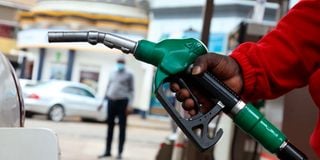Premium
More pain at the pump for Kenyans after record fuel price hike

A Fuel attendant holding a fuel pump at the filling station along Kimathi Street. In the latest monthly review by the Energy and Petroleum Regulatory Authority (Epra), Super petrol is up by Sh20.18 to retail at Sh179.30 per litre.
What you need to know:
- In the latest monthly review by the Energy and Petroleum Regulatory Authority (Epra), Super petrol is up by Sh20.18 to retail at Sh179.30 per litre.
- Diesel is up by Sh25 to retail at Sh165.00 per litre while Kerosene is up by Sh20 to retail at Sh147.94 per litre.
- During his inauguration President William Ruto hinted that he would do away with subsidies on fuel and food, arguing that they are a huge burden to the exchequer and often lead to product shortages.
Kenya on Wednesday hit a record high in fuel prices in line with the new government policy to remove subsidies on petroleum fuels.
In the latest monthly review by the Energy and Petroleum Regulatory Authority (Epra), Super Petrol is up by Sh20.18 to retail at Sh179.30 per litre in Nairobi.
Diesel is up by Sh25 to retail at Sh165.00 per litre while Kerosene is up by Sh20 to retail at Sh147.94 per litre.
The prices will be in force from September 15 to October 14, 2022.
Epra said that although the subsidy for Super Petrol had been removed, a subsidy of Sh20.82/litre and Sh26.25/litre had been retained for Diesel and Kerosene respectively in order to cushion consumers from the high prices.
The prices are inclusive of the 8 per cent Value Added tax in line with the provisions of the Finance Act 2018, the Tax Laws (Amendment) Act 2020 and the revised rates for excise duty for inflation as per Legal Notice No.194 of 2020.
During his inauguration President William Ruto hinted that he would do away with subsidies on fuel and food, arguing that they are a huge burden to the exchequer and often lead to product shortages.
The Head of State said subsidy interventions by the outgoing administration have not borne fruit, and that his administration would focus on enhancing production to increase the supply of commodities, especially agricultural products, to naturally lower prices.
“On fuel subsidy alone, taxpayers have spent Sh144 billion, including Sh60 billion in the last four months alone. If the subsidy continues to the end of the financial year, it will cost taxpayers Sh280 billion, equivalent to the entire national government development budget,” said President Ruto.





